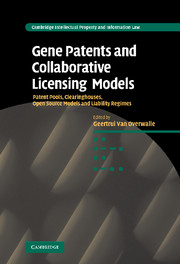 Gene Patents and Collaborative Licensing Models
Gene Patents and Collaborative Licensing Models from Part II - Clearinghouses
Published online by Cambridge University Press: 14 January 2010
Introduction
Agricultural research has historically been publicly funded and delivered as a public good directly to farmers through seeds which incorporate advanced genetics or through the demonstration of improved agricultural practices. However, over the last twenty years, the results of agricultural research have increasingly been treated as private goods and protected through various forms of IP belonging to the primary innovator. IP protection has provided incentives to develop new crops that may otherwise not have been developed and, in particular, to invest in the increasingly expensive regulatory processes for approvals of genetically engineered crops. In contrast to many technology sectors, public and non-profit institutions have played a very large role in new technological innovations in agriculture, accounting for nearly one quarter of new patented innovations in this sector. However, this technology “portfolio” is fragmented across a large number of institutions and has not been strategically managed to enable the advancement of a number of projects. The Public Intellectual Property Resource for Agriculture (PIPRA) is a clearinghouse institution that is designed to integrate this fragmented IP portfolio through collaborative management. PIPRA's goal is to mobilize technologies from a wide range of public/non-profit technology providers to address specific projects for the improvement of subsistence and specialty crops that are not being addressed by commercial seed and agricultural biotechnology companies. PIPRA and its members believe this landscape of IP can be more effectively managed collaboratively and by using a set of shared principles.
To save this book to your Kindle, first ensure [email protected] is added to your Approved Personal Document E-mail List under your Personal Document Settings on the Manage Your Content and Devices page of your Amazon account. Then enter the ‘name’ part of your Kindle email address below. Find out more about saving to your Kindle.
Note you can select to save to either the @free.kindle.com or @kindle.com variations. ‘@free.kindle.com’ emails are free but can only be saved to your device when it is connected to wi-fi. ‘@kindle.com’ emails can be delivered even when you are not connected to wi-fi, but note that service fees apply.
Find out more about the Kindle Personal Document Service.
To save content items to your account, please confirm that you agree to abide by our usage policies. If this is the first time you use this feature, you will be asked to authorise Cambridge Core to connect with your account. Find out more about saving content to Dropbox.
To save content items to your account, please confirm that you agree to abide by our usage policies. If this is the first time you use this feature, you will be asked to authorise Cambridge Core to connect with your account. Find out more about saving content to Google Drive.